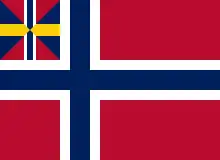Illarion Ivanovich Vorontsov-Dashkov Илларион Иванович Воронцов-Дашков | |
|---|---|
 Count Illarion Vorontsov-Dashkov | |
| Born | 27 May 1837 Saint Petersburg, Russian Empire |
| Died | 15 January 1916 (aged 78) Alupka, Taurida Governorate, Russian Empire |
| Allegiance | |
| Service/ | Imperial Russian Army |
| Years of service | 1856–1916 |
| Rank | General of the Cavalry |
| Commands held | Russian Caucasus Army |
| Battles/wars | Caucasian War Russo-Turkish War Revolution of 1905 World War I |
| Awards | see below |
Count Illarion Ivanovich Vorontsov-Dashkov (Russian: Илларио́н Ива́нович Воронцов-Дашков; 27 May 1837 – 15 January 1916) was a notable representative of the Vorontsov family. He served as Minister of Imperial Properties in 1881-97 and the Governor-General of the Caucasus Viceroyalty between 1905 and 1915.
Career
Illarion Vorontsov was born on 27 May 1837 in Saint Petersburg. He took part in the conquest of Central Asia in the 1860s and was appointed Major General in 1866. He was in charge of the Hussar regiment of the Leub Guard in 1867–74. He was on friendly terms with the future Alexander III of Russia and, following Alexander's father's assassination, established a counter-revolutionary squad, or druzhina called the Holy Brotherhood.
Alexander III put Vorontsov-Dashkov in charge of the imperial court and made him Full General of Cavalry. He also was made responsible for imperial stud farms and vineyards. Following Nicholas II's coronation, he was dislodged from the office of Minister of Imperial Properties but was appointed to the State Council of Imperial Russia instead. The Russian Revolution of 1905 recalled Vorontsov to active service, and he ascended to the helm of the Viceroyalty of the Caucasus.[1]
As Russia's second-to-last viceroy of the Caucasus, Vorontsov-Dashkov implemented several reformist policies, but his time in office was marred by a general era of revolution, war, and social upheaval.[2]
He was officially in charge of the victorious Russian forces in the Battle of Sarikamish during the early months of World War I, although the effective command lay with General Alexander Myshlayevsky. In September 1915 he was removed from command and replaced with Grand Duke Nicholas.[3] He died on 15 January 1916 in his Vorontsov Palace.
Family
He married in 1867 Countess Elizaveta Andreevna Shuvalova, daughter of Count Andrei Petrovich Shuvalov. His youngest son Alexander's descendants represent the only continuation of the Vorontsov family in the male line.
Awards and honours
%252C(_%D0%9F%D0%B0%D1%80%D0%B3%D0%BE%D0%BB%D0%BE%D0%B2%D0%BE_%D0%BF%D0%BE%D1%81.).JPG.webp)
- Russian decorations[4]
- Knight of St. Anna, 4th class, 1861; 3rd Class, 1864; 1st Class, 1870
- Gold Sword for Bravery, 4 June 1862
- Knight of St. Vladimir, 4th Class with Swords and Bow, 1865; 3rd Class with Swords, 1867; 2nd Class, 1874; 1st Class, 1894
- Knight of St. George, 4th class, for distinguished service during the war, 27 June 1867; 3rd Class "For the valiant skilful leadership of the Caucasian Army, whose heroic exploits achieved brilliant military success in actions against the Turks", 15 August 1915
- Knight of St. Stanislaus, 1st Class, 1868
- Knight of the White Eagle, with Swords, 1878
- Knight of St. Alexander Nevsky, 1883; in Diamonds, 1888
- Knight of St. Andrew, 14 May 1896; in Diamonds, 1904
- Portraits of the Emperors Alexander II and Alexander III, in Diamonds, 1908
- Portrait of Emperor Alexander III, in Diamonds, 21 February 1913
- Foreign decorations[4]
.svg.png.webp) Kingdom of Prussia:
Kingdom of Prussia:
- Knight of the Red Eagle, 2nd Class with Star, 7 May 1873;[5] Grand Cross, 9 September 1881; in Diamonds, 1884[6]
- Knight of the Black Eagle, 1889
.svg.png.webp) Saxe-Weimar-Eisenach: Knight of the White Falcon, 26 September 1865;[7] Grand Cross, 1896[8]
Saxe-Weimar-Eisenach: Knight of the White Falcon, 26 September 1865;[7] Grand Cross, 1896[8] Grand Duchy of Hesse:
Grand Duchy of Hesse:
- Commander of the Merit Order of Philip the Magnanimous, 1st Class, 1865; Grand Cross, 1883
- Grand Cross of the Ludwig Order, 1883
.svg.png.webp) French Empire: Officer of the Legion of Honour, 1865; Grand Cross, 1883[9]
French Empire: Officer of the Legion of Honour, 1865; Grand Cross, 1883[9] Württemberg: Knight of the Württemberg Crown, 1865; Grand Cross, 1883[10]
Württemberg: Knight of the Württemberg Crown, 1865; Grand Cross, 1883[10]
.svg.png.webp) Austria-Hungary:[11]
Austria-Hungary:[11]
.svg.png.webp)
 Sweden-Norway:
Sweden-Norway:
- Commander Grand Cross of the Sword, 19 July 1875[12]
- Knight of the Seraphim, with Collar, 15 February 1892[13]
.svg.png.webp) Kingdom of Greece: Grand Cross of the Redeemer, 1876
Kingdom of Greece: Grand Cross of the Redeemer, 1876 Denmark:[14]
Denmark:[14]
- Grand Cross of the Dannebrog, 19 August 1876; in Diamonds, 3 October 1881
- Knight of the Elephant, 21 December 1891
.svg.png.webp) Principality of Serbia:[15]
Principality of Serbia:[15]
.svg.png.webp) Principality of Montenegro: Grand Cross of the Order of Prince Danilo I, 1882[15]
Principality of Montenegro: Grand Cross of the Order of Prince Danilo I, 1882[15].svg.png.webp) Baden: Knight of the House Order of Fidelity, 1883[16]
Baden: Knight of the House Order of Fidelity, 1883[16].svg.png.webp) Kingdom of Bavaria: Grand Cross of Merit of the Bavarian Crown, 1883[17]
Kingdom of Bavaria: Grand Cross of Merit of the Bavarian Crown, 1883[17].svg.png.webp) Belgium: Grand Cordon of the Royal Order of Leopold, 1883
Belgium: Grand Cordon of the Royal Order of Leopold, 1883 Principality of Bulgaria: Grand Cross of St. Alexander, 1883
Principality of Bulgaria: Grand Cross of St. Alexander, 1883.svg.png.webp)
.svg.png.webp)
.svg.png.webp) Ernestine duchies: Grand Cross of the Saxe-Ernestine House Order, 1883[18]
Ernestine duchies: Grand Cross of the Saxe-Ernestine House Order, 1883[18].svg.png.webp) Holy See: Grand Cross of the Order of Pope Pius IX, 1883
Holy See: Grand Cross of the Order of Pope Pius IX, 1883.svg.png.webp) Empire of Japan: Grand Cordon of the Rising Sun, 1883
Empire of Japan: Grand Cordon of the Rising Sun, 1883 Netherlands: Grand Cross of the Netherlands Lion, 1883
Netherlands: Grand Cross of the Netherlands Lion, 1883.svg.png.webp) Spain: Grand Cross of the Order of Charles III, 2 November 1883[19]
Spain: Grand Cross of the Order of Charles III, 2 November 1883[19]_crowned.svg.png.webp) Kingdom of Italy: Grand Cross of Saints Maurice and Lazarus, 1884
Kingdom of Italy: Grand Cross of Saints Maurice and Lazarus, 1884 Persian Empire: Order of the August Portrait, in Diamonds, 1884
Persian Empire: Order of the August Portrait, in Diamonds, 1884 Mecklenburg: Grand Cross of the Wendish Crown, 1889
Mecklenburg: Grand Cross of the Wendish Crown, 1889.svg.png.webp) Siam: Grand Cross of the White Elephant, 1892
Siam: Grand Cross of the White Elephant, 1892.svg.png.webp) Ottoman Empire: Order of Osmanieh, 1st Class, 1887; in Diamonds, 1893
Ottoman Empire: Order of Osmanieh, 1st Class, 1887; in Diamonds, 1893 Oldenburg: Grand Cross of the Order of Duke Peter Friedrich Ludwig, 1895
Oldenburg: Grand Cross of the Order of Duke Peter Friedrich Ludwig, 1895 Kingdom of Romania: Grand Cross of the Star of Romania, 1895
Kingdom of Romania: Grand Cross of the Star of Romania, 1895.svg.png.webp) Qing dynasty: Order of the Double Dragon, Grade I Class III, 1896
Qing dynasty: Order of the Double Dragon, Grade I Class III, 1896 United Kingdom: Honorary Grand Cross of the Royal Victorian Order, 30 June 1896[20]
United Kingdom: Honorary Grand Cross of the Royal Victorian Order, 30 June 1896[20]
Ancestry
| Ancestors of Count Illarion Ivanovich Vorontsov-Dashkov | ||||||||||||||||||||||||||||||||||||||||||||||||||||||||||||||||||||||||||||||||||||||||||||||||||||||||||||||||||||||||||||||||||||||||||||||||||||||||||||||||||||||||||||||||||||||||||||||||||||||||||||||||||||||||||||||||||||||||||||||||||||||||||||||||||||||||||||||||||||||||||||||||||||||||||||||||||||||||||||||||||||||||||||||||||||||||||||||||||||||||||||||||||||||||||||||||||||||||||||||||||||||||||||||||||||||||||||||||||||||||||||||||||||||||||||||||||||||||||||||||||||||||||||||||||||||||||||||||||||||||||||||||||||||||||||||||||||||||||||||||||||||||||||||||||||||||||||||||
|---|---|---|---|---|---|---|---|---|---|---|---|---|---|---|---|---|---|---|---|---|---|---|---|---|---|---|---|---|---|---|---|---|---|---|---|---|---|---|---|---|---|---|---|---|---|---|---|---|---|---|---|---|---|---|---|---|---|---|---|---|---|---|---|---|---|---|---|---|---|---|---|---|---|---|---|---|---|---|---|---|---|---|---|---|---|---|---|---|---|---|---|---|---|---|---|---|---|---|---|---|---|---|---|---|---|---|---|---|---|---|---|---|---|---|---|---|---|---|---|---|---|---|---|---|---|---|---|---|---|---|---|---|---|---|---|---|---|---|---|---|---|---|---|---|---|---|---|---|---|---|---|---|---|---|---|---|---|---|---|---|---|---|---|---|---|---|---|---|---|---|---|---|---|---|---|---|---|---|---|---|---|---|---|---|---|---|---|---|---|---|---|---|---|---|---|---|---|---|---|---|---|---|---|---|---|---|---|---|---|---|---|---|---|---|---|---|---|---|---|---|---|---|---|---|---|---|---|---|---|---|---|---|---|---|---|---|---|---|---|---|---|---|---|---|---|---|---|---|---|---|---|---|---|---|---|---|---|---|---|---|---|---|---|---|---|---|---|---|---|---|---|---|---|---|---|---|---|---|---|---|---|---|---|---|---|---|---|---|---|---|---|---|---|---|---|---|---|---|---|---|---|---|---|---|---|---|---|---|---|---|---|---|---|---|---|---|---|---|---|---|---|---|---|---|---|---|---|---|---|---|---|---|---|---|---|---|---|---|---|---|---|---|---|---|---|---|---|---|---|---|---|---|---|---|---|---|---|---|---|---|---|---|---|---|---|---|---|---|---|---|---|---|---|---|---|---|---|---|---|---|---|---|---|---|---|---|---|---|---|---|---|---|---|---|---|---|---|---|---|---|---|---|---|---|---|---|---|---|---|---|---|---|---|---|---|---|---|---|---|---|---|---|---|---|---|---|---|---|---|---|---|---|---|---|---|---|---|---|---|---|---|---|---|---|---|---|---|---|---|---|---|---|---|---|---|---|---|---|---|---|---|---|---|---|---|---|---|---|---|---|---|---|---|---|---|---|---|---|---|---|---|---|---|---|---|---|---|---|---|---|---|---|---|---|---|---|---|---|---|---|---|---|---|---|---|---|---|---|---|---|---|---|---|---|---|---|---|---|---|---|---|---|---|---|---|---|---|---|---|---|---|---|---|---|---|---|---|---|---|---|---|---|---|---|---|---|---|---|---|---|---|---|---|---|---|---|---|---|---|---|---|---|---|---|---|---|---|---|---|---|---|---|---|---|---|---|---|---|---|---|---|---|---|---|---|---|---|---|---|---|---|---|
| ||||||||||||||||||||||||||||||||||||||||||||||||||||||||||||||||||||||||||||||||||||||||||||||||||||||||||||||||||||||||||||||||||||||||||||||||||||||||||||||||||||||||||||||||||||||||||||||||||||||||||||||||||||||||||||||||||||||||||||||||||||||||||||||||||||||||||||||||||||||||||||||||||||||||||||||||||||||||||||||||||||||||||||||||||||||||||||||||||||||||||||||||||||||||||||||||||||||||||||||||||||||||||||||||||||||||||||||||||||||||||||||||||||||||||||||||||||||||||||||||||||||||||||||||||||||||||||||||||||||||||||||||||||||||||||||||||||||||||||||||||||||||||||||||||||||||||||||||
References
- ↑ W.E.D. Allen and Paul Muratoff, Caucasian Battlefields, A History of Wars on the Turco-Caucasian Border, 1828-1921, 242
- ↑ Riegg, Stephen (2018). ""Neotraditionalist Rule to the Rescue of the Empire? Viceroy I. Vorontsov-Dashkov amid Crises in the Caucasus, 1905-1915"". Ab Imperio. 19 (3): 115-139. doi:10.1353/imp.2018.0061. S2CID 165441131.
- ↑ W.E.D. Allen and Paul Muratoff, Caucasian Battlefields, A History of Wars on the Turco-Caucasian Border, 1828-1921, 322
- 1 2 Russian Imperial Army - Illarion Ivanovich Vorontsov-Dashkov Archived 2016-03-04 at the Wayback Machine (In Russian)
- ↑ "Rother Adler-orden", Königlich Preussische Ordensliste (in German), vol. 1, Berlin: Gedruckt in der Reichsdruckerei, 1877, p. 74 – via hathitrust.org
- ↑ "Rother Adler-orden", Königlich Preussische Ordensliste (in German), vol. 1, Berlin: Gedruckt in der Reichsdruckerei, 1886, p. 26 – via hathitrust.org
- ↑ Staatshandbuch für das Großherzogtum Sachsen / Sachsen-Weimar-Eisenach (1869), "Großherzogliche Hausorden" p. 28
- ↑ Staatshandbuch für das Großherzogtum Sachsen / Sachsen-Weimar-Eisenach (1900), "Großherzogliche Hausorden" p. 61
- ↑ M. Wattel, B. Wattel. (2009). Les Grand'Croix de la Légion d'honneur de 1805 à nos jours. Titulaires français et étrangers. Paris: Archives & Culture. p. 516. ISBN 978-2-35077-135-9.
- ↑ Hof- und Staats-Handbuch des Königreich Württemberg (1907), "Königliche Orden" p. 43
- ↑ "Ritter-Orden", Hof- und Staatshandbuch der Österreichisch-Ungarischen Monarchie, 1890, pp. 86, 98, 130, 185, retrieved 10 July 2020
- ↑ "Kongl. Svenska Riddare-Ordnarne" (PDF), Sveriges statskalender för Skottåret 1892 (in Swedish), Stockholm: Kongl. Boktryckeriet. P.A. Norstedt & Soner, 1891, p. 394, retrieved 16 November 2020 – via gupea.ub.gu.se
- ↑ Sveriges Statskalender (in Swedish), 1905, p. 440, retrieved 2018-01-06 – via runeberg.org
- ↑ Bille-Hansen, A. C.; Holck, Harald, eds. (1912) [1st pub.:1801]. Statshaandbog for Kongeriget Danmark for Aaret 1912 [State Manual of the Kingdom of Denmark for the Year 1912] (PDF). Kongelig Dansk Hof- og Statskalender (in Danish). Copenhagen: J.H. Schultz A.-S. Universitetsbogtrykkeri. pp. 4, 17. Retrieved 30 April 2020 – via da:DIS Danmark.
- 1 2 Acović, Dragomir (2012). Slava i čast: Odlikovanja među Srbima, Srbi među odlikovanjima. Belgrade: Službeni Glasnik. p. 624.
- ↑ Hof- und Staats-Handbuch des Großherzogtum Baden (1896), "Großherzogliche Orden" p. 64
- ↑ Hof- und Staats-Handbuch des Königreichs Bayern (1906), "Königliche-Orden" p. 25
- ↑ Staatshandbücher für das Herzogtum Sachsen-Coburg und Gotha (1890), "Herzogliche Sachsen-Ernestinischer Hausorden" p. 131
- ↑ "Real y distinguida orden de Carlos III". Guía Oficial de España (in Spanish). 1900. p. 176. Retrieved 10 July 2020.
- ↑ Shaw, Wm. A. (1906) The Knights of England, I, London, p. 422